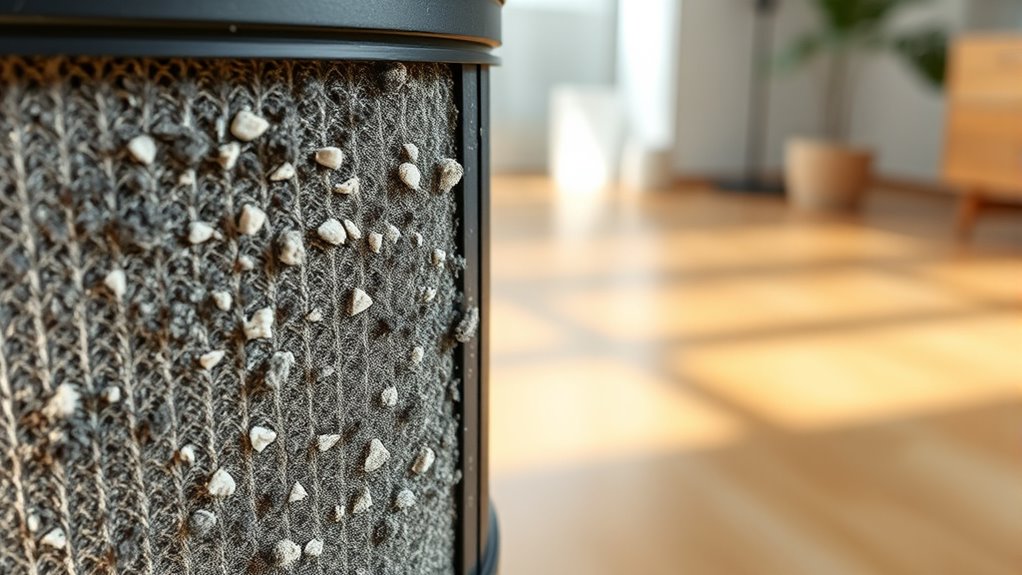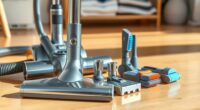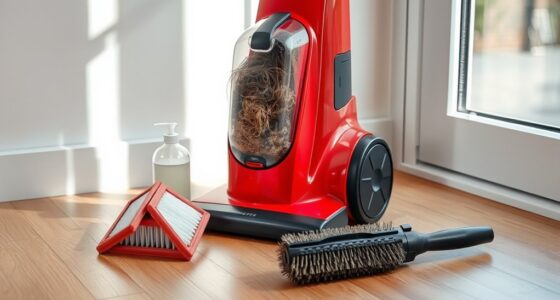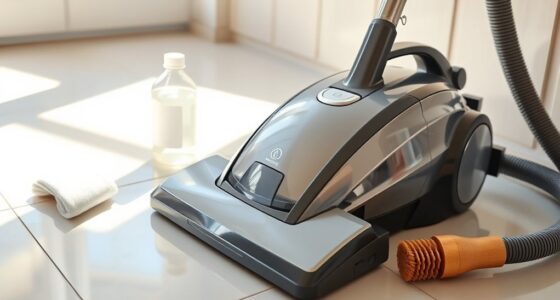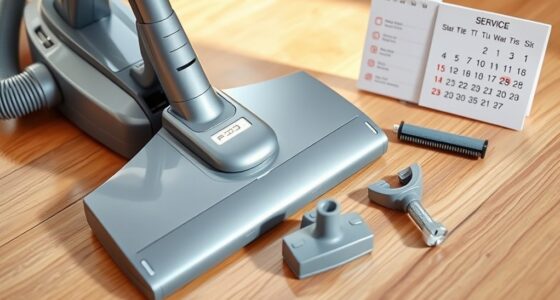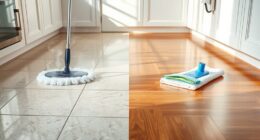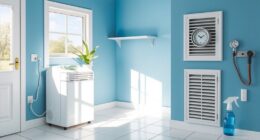To keep your vacuum working efficiently and maintain good air quality, replace or clean your filter regularly. HEPA filters should be changed every 6 to 12 months, while foam and carbon filters last around 3 to 6 months, depending on use. If you notice reduced suction, odors, or visible dirt, it’s time for a change. Knowing when and how to care for your filters can improve performance—discover more tips below.
Key Takeaways
- Replace HEPA filters every 6 to 12 months for optimal air quality and performance.
- Foam and cloth filters generally last 3 to 6 months, depending on usage frequency.
- Check filters regularly for dirt, damage, or odors to determine if replacement is needed sooner.
- Heavily used or dusty environments may require more frequent filter changes to maintain suction.
- Follow the manufacturer’s guidelines for your specific vacuum model to ensure proper filter maintenance.
Understanding Different Types of Vacuum Filters
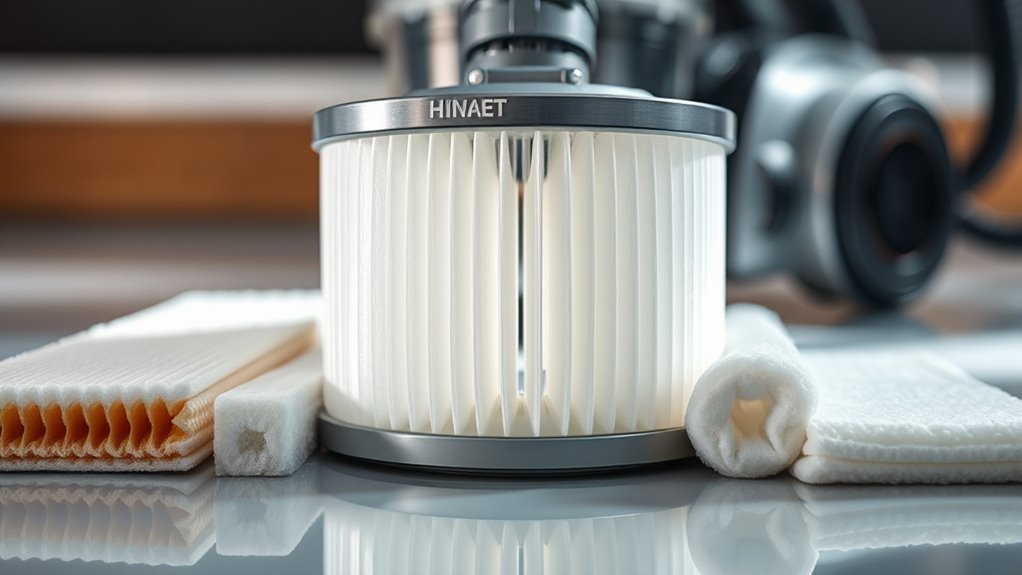
Understanding the different types of vacuum filters is essential for maintaining your vacuum’s performance. HEPA filters are designed to trap tiny particles, including allergens and dust mites, making them ideal if anyone in your home has allergies. Foam filters, on the other hand, are usually used to protect the motor and improve airflow. They’re washable and easy to replace, offering a cost-effective way to keep your vacuum running smoothly. Some models combine HEPA and foam filters for superior filtration and motor protection. Knowing which filter your vacuum uses helps you maintain it properly and guarantees it performs efficiently. Regularly cleaning or replacing these filters prevents buildup that can reduce suction power and compromise air quality. Additionally, understanding the benefits of different filter types can help you choose the right replacement for your specific needs.
Signs Your Vacuum Filter Needs Replacing
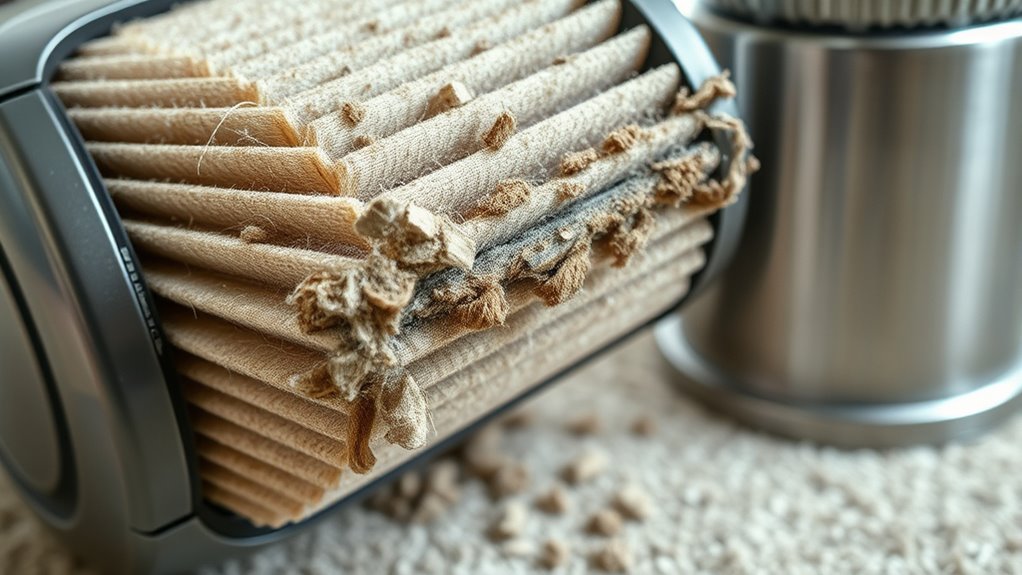
If your vacuum isn’t cleaning as effectively as it used to, it might be a sign that the filter needs replacing. Over time, the filter material becomes clogged or damaged, reducing airflow and suction. Pay attention to these signs:
A declining vacuum performance often signals a clogged or damaged filter needing replacement.
- Reduced suction power, indicating airflow is blocked.
- Visible dirt or debris buildup on the filter surface, suggesting it’s saturated.
- Unusual odors during use, caused by trapped particles and mold in the filter material.
Additionally, if your vacuum’s design relies heavily on a specific filter type, its efficiency declines faster when the filter is compromised. Regularly inspecting the filter for wear or damage helps maintain ideal performance, ensuring your vacuum continues to operate effectively. Proper filter maintenance is also essential for preserving the color accuracy and overall image quality of your home theatre projector.
Recommended Replacement Intervals for Various Filter Types
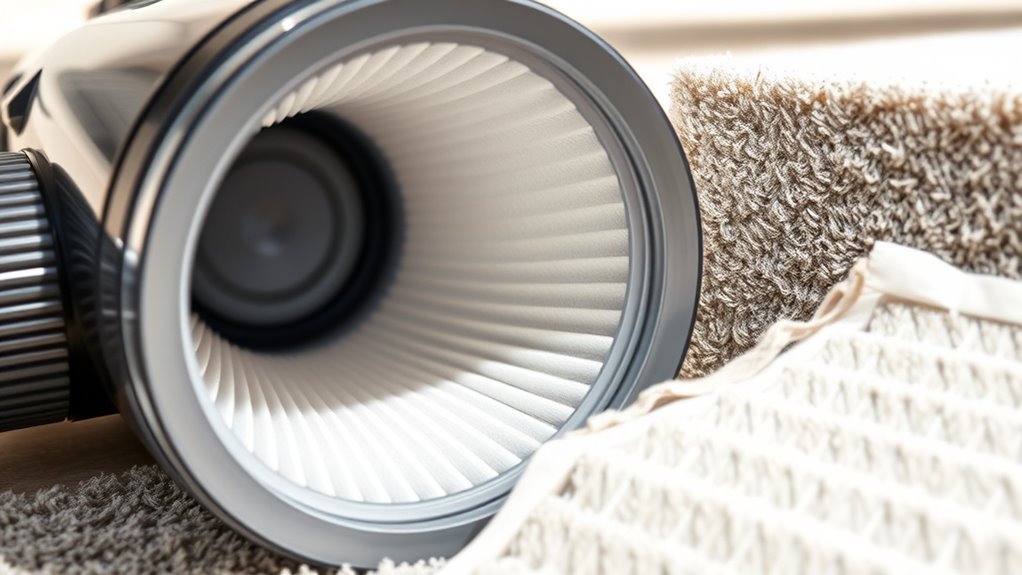
To keep your vacuum performing at its best, replacing filters at recommended intervals is key. For HEPA filters, replace every 6 to 12 months to maintain ideal air quality and ensure they’re effectively capturing allergens. Standard foam or cloth filters often last 3 to 6 months, depending on usage, and should be cleaned or replaced accordingly. Carbon filters, which help reduce odors, typically need replacement every 4 to 6 months. The durability of filter materials influences these intervals—denser, high-quality materials tend to last longer. Regular replacement prevents buildup of dust and debris, which can decrease filtration efficiency and air quality. Following these guidelines helps your vacuum maintain peak performance and guarantees your indoor environment stays healthier.
Factors That Influence Filter Longevity
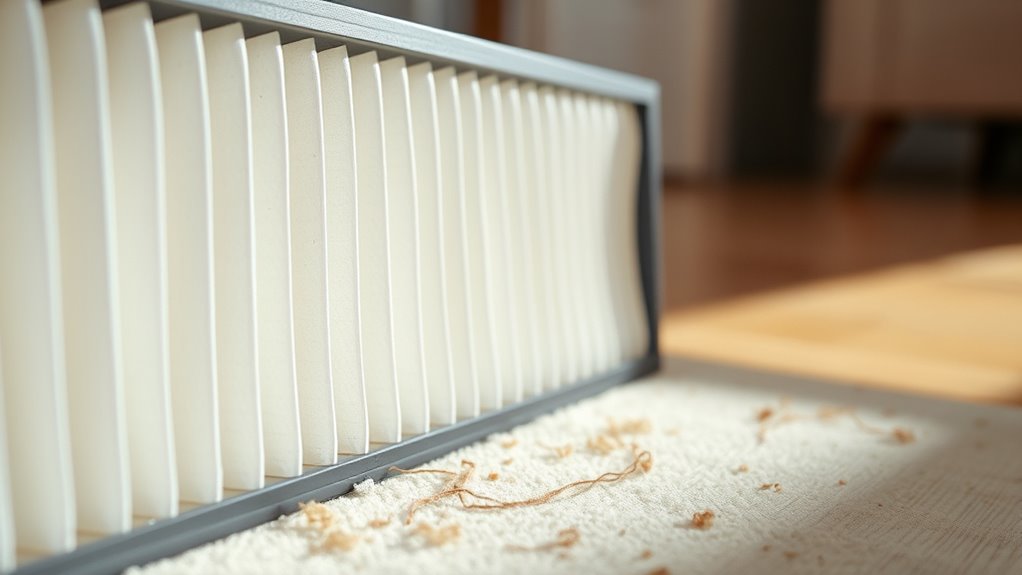
How often you use your vacuum can directly affect how long the filter lasts. The durability of the filter material also plays a big role in its lifespan. Understanding these factors helps you keep your vacuum working efficiently longer.
Usage Frequency Impact
The frequency with which you use your vacuum filter directly affects its lifespan. The more often you vacuum, the quicker dust buildup occurs, which can clog the filter and reduce its effectiveness. Regular use without proper maintenance can also impact filter compatibility, causing strain on the vacuum’s motor. To optimize filter longevity, consider these factors: 1. Vacuuming frequently increases dust buildup, requiring more frequent filter replacements. 2. Using your vacuum on high-traffic or dusty floors accelerates filter wear. 3. Ensuring your filter matches your vacuum model helps prevent premature deterioration and maintains airflow efficiency. Additionally, understanding filter maintenance practices can significantly extend your filter’s functional life.
Filter Material Durability
Ever wondered why some vacuum filters last longer than others? It all comes down to filter material durability and filter manufacturing quality. High-quality filters are crafted from durable materials that resist wear and tear, maintaining their effectiveness over time. Cheaper filters often use inferior materials that break down quickly, reducing lifespan. The manufacturing process also plays a role; precise assembly ensures filters stay intact and perform well longer. If you choose filters made with superior materials and quality craftsmanship, you’ll get more value and fewer replacements. Additionally, filter design can influence how well a filter holds up under frequent use, impacting its overall longevity. Keep in mind, even the best filters won’t last forever—so understanding these factors helps you decide when it’s time to replace yours for excellent vacuum performance.
How to Properly Maintain and Clean Your Filters
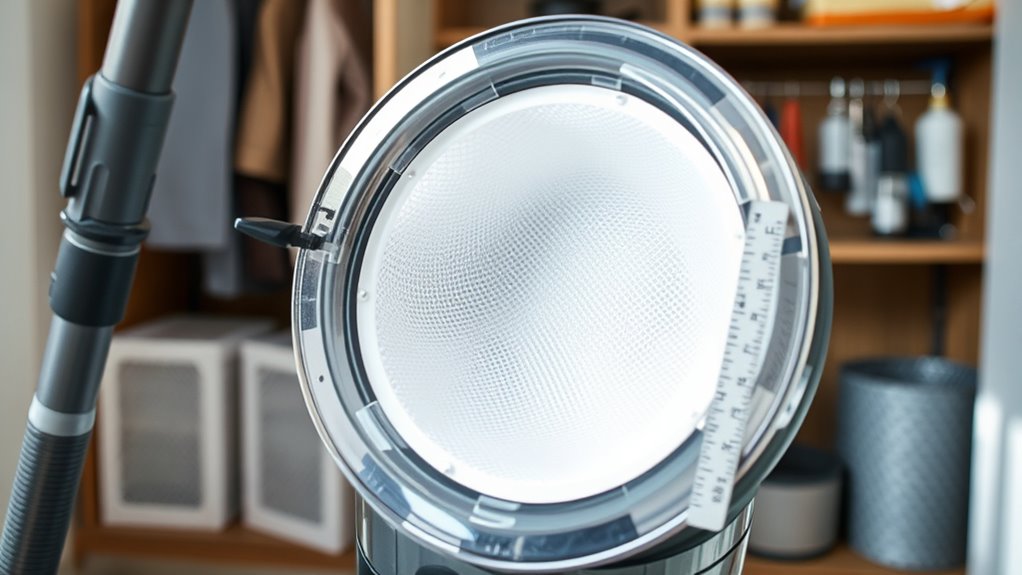
Maintaining and cleaning your vacuum filters regularly is essential to guarantee maximum performance and prolong their lifespan. Proper care ensures your vacuum works efficiently and helps with air purifier compatibility. To do DIY filter cleaning effectively, follow these steps:
Regular filter maintenance boosts vacuum efficiency and extends lifespan.
- Remove the filter carefully and check manufacturer guidelines for cleaning instructions.
- Gently wash the filter with water or a mild cleaning solution, avoiding harsh chemicals.
- Allow the filter to fully dry before reinstalling to prevent mold and ensure ideal airflow.
The Impact of Dirty Filters on Vacuum Performance
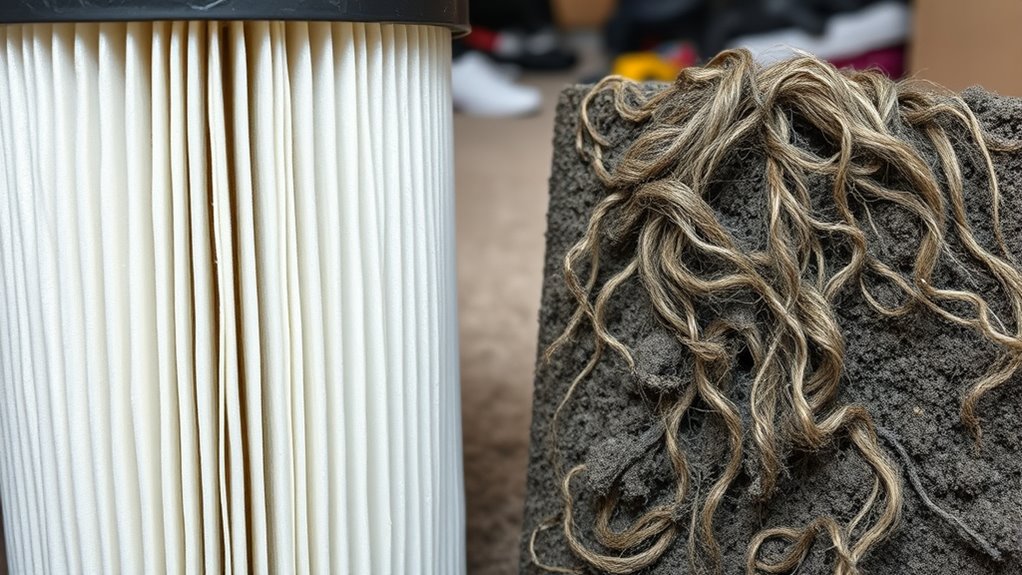
When your vacuum filters get dirty, you’ll notice it loses suction power, making cleaning less effective. Plus, allergens can spread more easily into the air, affecting your indoor air quality. Over time, a dirty filter can also shorten your vacuum’s lifespan, leading to more repairs or replacements.
Reduced Suction Power
Have you noticed your vacuum isn’t cleaning as effectively as it used to? Reduced suction power often results from a clogged filter, which hinders airflow. This is especially true if the filter material becomes packed with debris or dust. Your vacuum design can also exacerbate the problem if it’s not optimized for airflow. To address this, consider:
- Replacing the filter regularly to maintain proper airflow and suction.
- Choosing a filter material suited for your vacuum’s design to prevent clogging.
- Ensuring the filter fits correctly for peak performance.
When filters are dirty, they restrict air passage, forcing your vacuum to work harder without improving cleaning power. Keeping your filter clean ensures your vacuum maintains its suction power and performs efficiently.
Increased Allergens Spread
A dirty filter doesn’t just reduce your vacuum’s suction—it also releases trapped allergens back into the air. When filters like HEPA filters aren’t replaced regularly, allergens such as pollen, pet dander, and dust mites become airborne again. This can worsen allergies or asthma symptoms. To prevent this, proper HEPA maintenance and ensuring filter compatibility are essential. Regularly replacing filters not only improves vacuum performance but also contributes to a healthier indoor environment by reducing allergen circulation.
Shortened Vacuum Lifespan
A dirty filter not only releases allergens back into the air but also puts extra strain on your vacuum’s motor. Over time, this reduces vacuum filter longevity and shortens the overall lifespan of your device. When filters become clogged or dirty, the vacuum has to work harder, increasing wear and tear on components. To maximize filter lifespan factors, follow these tips:
- Regularly clean or replace filters based on usage.
- Avoid using a vacuum with a filter that’s visibly dirty or clogged.
- Use the correct filter type recommended by the manufacturer.
- Understanding filtration systems, such as HEPA filters, can help you choose the best option for your needs.
Neglecting these steps accelerates motor fatigue and diminishes your vacuum’s efficiency, ultimately leading to more frequent repairs or replacement. Proper maintenance ensures your vacuum stays effective longer, saving you money and effort.
Tips for Extending the Life of Your Vacuum Filters
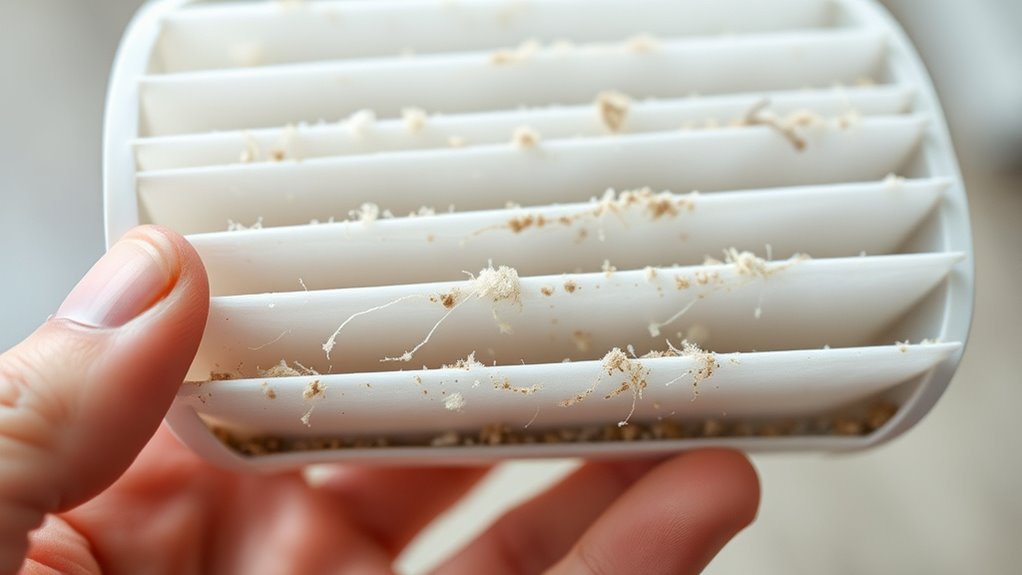
To make your vacuum filters last longer, regular maintenance is essential. Start by storing filters properly when not in use; keep them in a clean, dry place away from direct sunlight and moisture. This helps prevent damage from environmental factors that can degrade filter materials. Clean filters regularly according to your manufacturer’s instructions to remove dust and debris, reducing strain on the motor and maintaining suction. Avoid exposing filters to extreme temperatures or humidity, which can cause warping or mold growth. Using your vacuum correctly and avoiding overuse also prolongs filter life. Additionally, consider replacing filters at recommended intervals, but proper storage and care can substantially extend their usability, saving you money and ensuring the best vacuum performance. Paying attention to air quality considerations can also help you decide when it’s time for a filter change.
When to Consider Upgrading Your Vacuum Filter
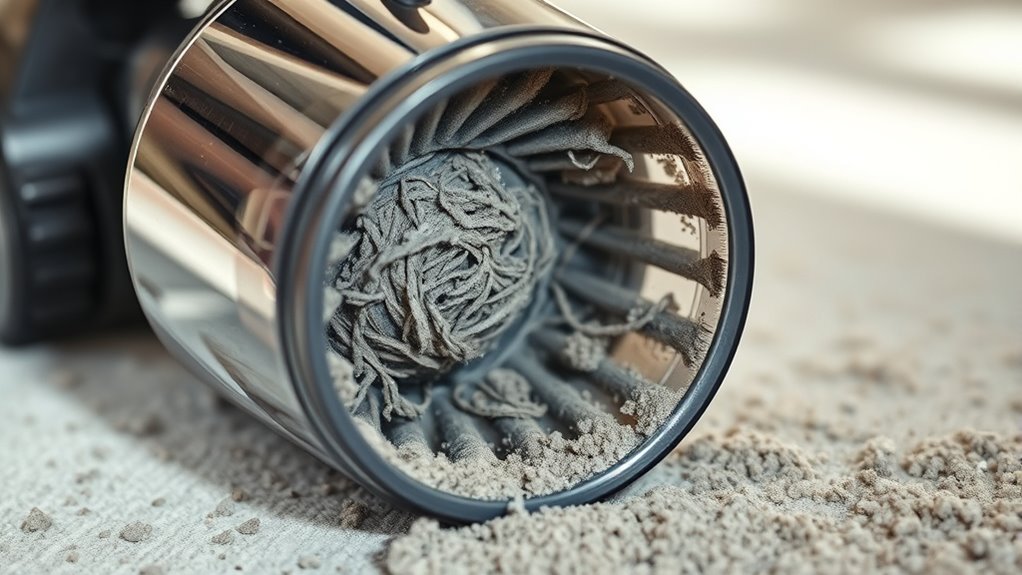
Recognizing the right time to upgrade your vacuum filter can considerably boost your appliance’s performance and longevity. If your filter material has become worn or damaged, it’s a clear sign to replace it. Additionally, consider upgrading if the filter size no longer fits properly, reducing efficiency. Here are key indicators:
- The filter material looks clogged, torn, or degraded.
- You notice a persistent musty odor during vacuuming.
- The current filter no longer fits snugly, compromising airflow and filtration.
- Using a compatible airless paint sprayer filter can improve overall performance and ensure better dust and allergen capture.
Upgrading to a filter with better material or an appropriate size ensures maximum performance. A higher-quality filter can trap more allergens and dust, improving air quality and prolonging your vacuum’s lifespan. Pay attention to these signs for the best results.
Common Myths About Filter Replacement
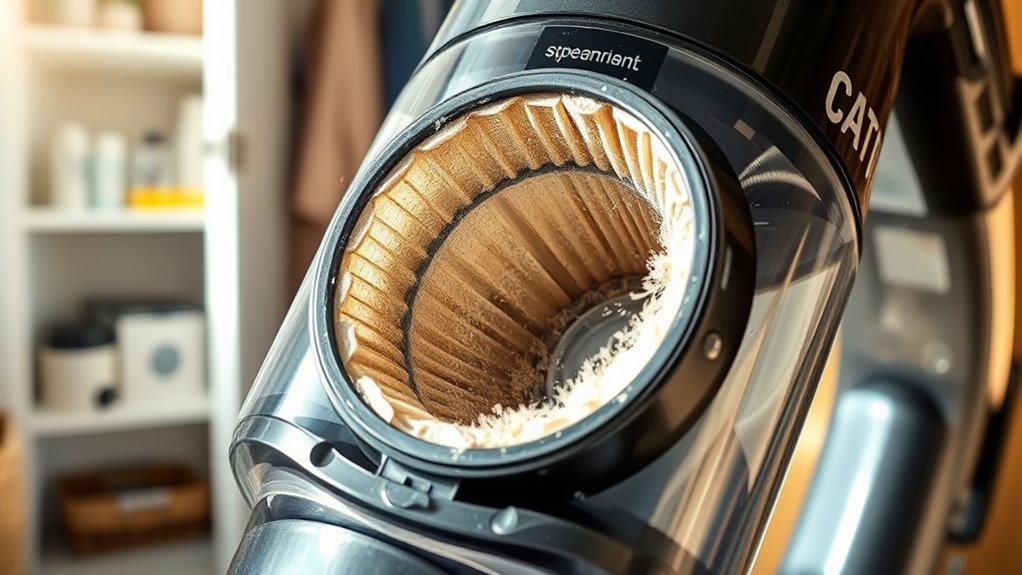
Many people believe filters last forever or that replacing them is too costly, but that’s not true. Not all filters are the same, and using the wrong one can hurt your vacuum’s performance. Understanding these myths helps you make smarter choices about filter maintenance. Additionally, selecting the appropriate filter type ensures optimal filtration and prolongs the life of your vacuum.
Filters Last Indefinitely
A common myth is that vacuum filters last forever and never need replacement. In reality, your filter’s lifespan depends on several factors, including its filter durability. Over time, filters accumulate dust, allergens, and debris, which reduces their effectiveness. Ignoring this can lead to decreased air quality and vacuum performance. To understand this better, consider:
- Regular use gradually diminishes filter lifespan.
- Exposure to pet hair or heavy dust accelerates filter deterioration.
- Proper maintenance can extend filter resilience but doesn’t prevent eventual replacement.
- The presence of airborne pollutants in your environment can also impact how quickly filters degrade.
Even the most durable filters need replacement eventually. Relying on the myth that filters last indefinitely can compromise your vacuum’s efficiency and your indoor air quality. Replace filters as recommended to maintain ideal performance.
Replacement Costs Excessive
Some believe that replacing vacuum filters is an expensive and unnecessary expense, but this myth often leads to neglecting proper maintenance. In reality, the cost of frequent filter replacements isn’t as high as you might think, especially when considering filter recycling options. Many filters are made from eco-friendly materials that can be recycled, reducing waste and cost. Investing in reusable or washable filters can also considerably lower long-term expenses. Proper maintenance ensures your vacuum runs efficiently, saving you money on repairs or replacements down the line. By choosing eco-conscious options, you support sustainability and reduce environmental impact. Ultimately, the small investment in timely filter replacement and recycling can extend your vacuum’s lifespan and improve its performance, making the cost worthwhile.
All Filters Same
It’s a common misconception that all vacuum filters are the same and can be used interchangeably. In reality, air purifier filters, HVAC filters, and vacuum filters each have unique designs and material requirements. Using the wrong type can reduce efficiency or damage your appliance. To clarify:
- Air purifier filters often contain HEPA media, essential for trapping tiny particles.
- HVAC filters are designed for large-scale air circulation and may not fit vacuum units properly.
- Vacuum filters need specific pore sizes to ensure top-notch suction and dirt removal.
Replacing filters with incompatible types can compromise air quality and appliance performance. Always check your manufacturer’s guidelines and match the filter type to your appliance’s specifications for the best results.
Best Practices for Disposing of Old Filters
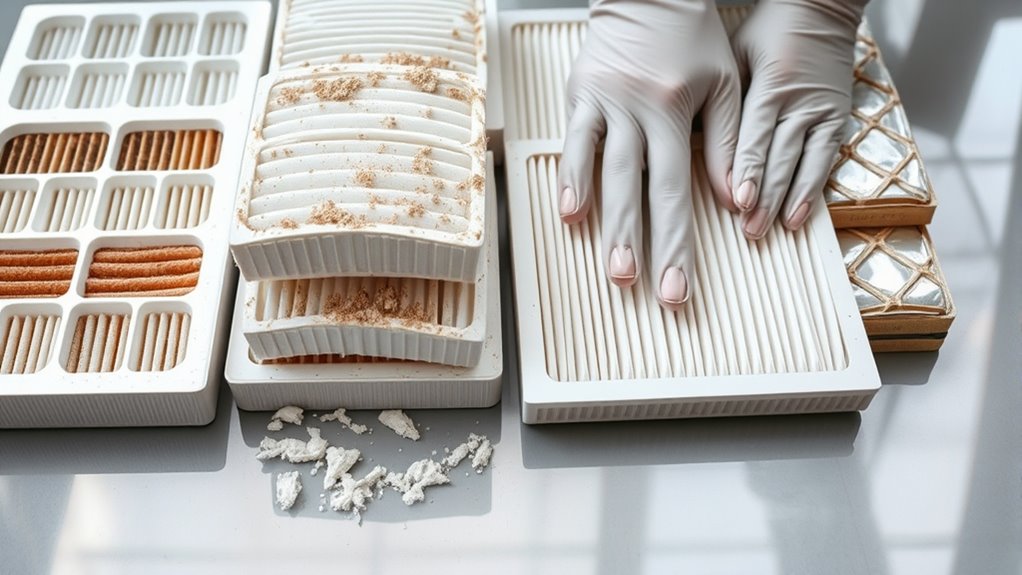
Properly disposing of old vacuum filters is essential to prevent environmental harm and guarantee safety. When it’s time to discard a filter, follow eco-friendly practices by sealing it in a plastic bag to contain dust and debris. Check local regulations for proper disposal methods, as some areas allow recycling of certain filter materials. Avoid tossing filters in regular trash if they contain hazardous substances or allergens. Instead, consider recycling programs or designated disposal sites for electronic waste or hazardous materials. Always wash your hands afterward to prevent exposure to dust or allergens. By practicing responsible filter disposal, you contribute to environmental preservation and ensure a safer home. Remember, eco-friendly disposal is a simple step toward sustainable living.
Frequently Asked Questions
Can Using Generic Filters Damage My Vacuum?
Using generic filters can damage your vacuum if they’re not compatible with your model. Poor filter compatibility might restrict airflow or cause parts to strain, ultimately reducing your vacuum’s lifespan. Always check your vacuum’s manual to make certain you’re using the right filter type. Sticking to manufacturer-recommended filters helps maintain peak performance, protects your vacuum, and extends its lifespan. Avoid cheap alternatives to prevent unnecessary repairs and guarantee effective cleaning.
Are HEPA Filters Worth the Extra Cost?
Imagine asthma sufferers noticing fewer flare-ups after switching to HEPA filters. Yes, HEPA filters are worth the extra cost because of their superior efficiency at capturing tiny allergens and dust mites. While the initial investment may seem higher, a cost comparison shows they last longer and improve air quality markedly. For those with allergies or respiratory issues, investing in HEPA filters can make a noticeable difference in daily comfort and health.
How Do Filter Replacements Affect Allergy Sufferers?
Replacing your vacuum filter regularly improves air quality and allergy relief. When you keep filters fresh, they effectively trap allergens like dust, pollen, and pet dander, preventing them from recirculating into your home’s air. This reduces allergy symptoms and creates a healthier environment. Neglecting filter replacements causes buildup, decreasing suction and allowing allergens to spread. So, stay consistent with replacements to breathe easier and enjoy cleaner, allergy-free air every day.
Can I Clean and Reuse Disposable Filters?
You can’t typically clean and reuse disposable filters, as their filter lifespan is limited and they’re designed for single use. Reusable options, however, can be cleaned according to manufacturer instructions, extending their lifespan and maintaining peak performance. Regularly check your vacuum’s filter condition, and switch to reusable filters if possible, to save money and reduce waste. Proper maintenance ensures your vacuum works efficiently and keeps allergens at bay.
What Are the Environmental Impacts of Filter Disposal?
Ever wondered about the environmental impact of throwing away vacuum filters? Disposing of filters contributes to landfill waste and pollution, especially if they’re made from non-biodegradable materials. By participating in recycling programs and choosing eco-friendly materials, you can reduce your carbon footprint. Reusing or recycling filters helps protect the environment, making your cleaning routine more sustainable. Isn’t it worth making small changes for a healthier planet?
Conclusion
Regularly replacing your vacuum filter is key to maintaining ideal performance and indoor air quality. Did you know that a dirty filter can reduce your vacuum’s efficiency by up to 50%? By understanding when and how to replace filters, you’ll keep your vacuum running smoothly and extend its lifespan. Stay proactive with maintenance, and you’ll enjoy cleaner floors and healthier air—saving you time and money in the long run.
